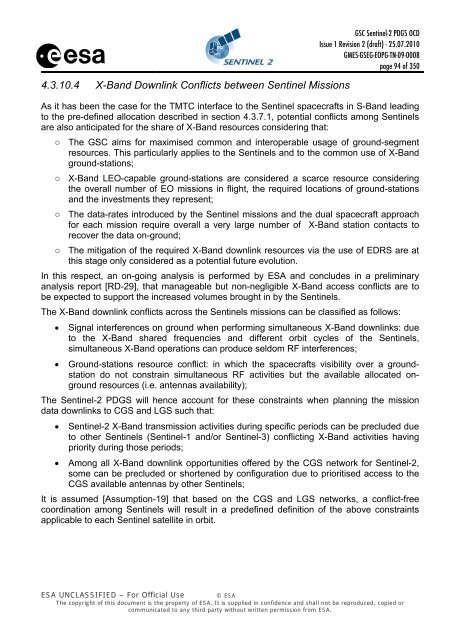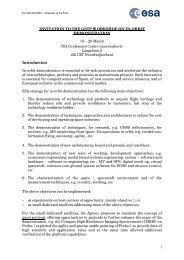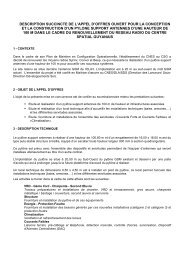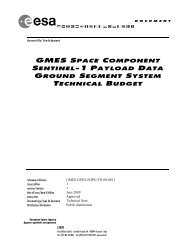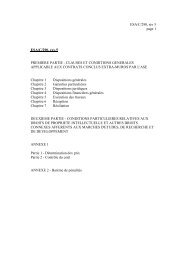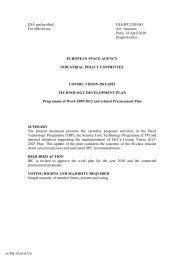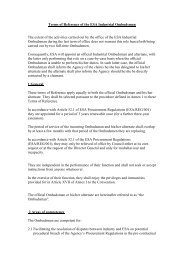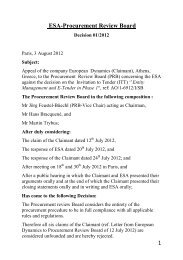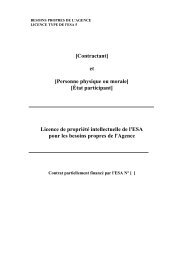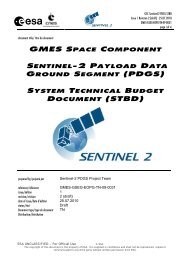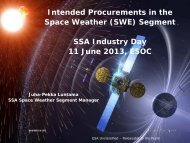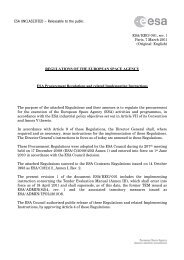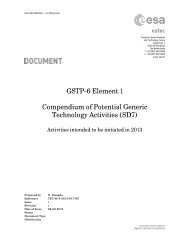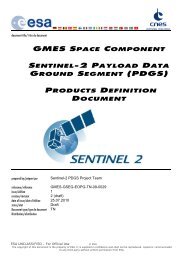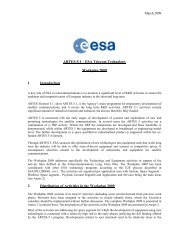- Page 1 and 2:
document title/ titre du document P
- Page 3 and 4:
GSC Sentinel-2 PDGS OCD issue 1 rev
- Page 5 and 6:
GSC Sentinel-2 PDGS OCD issue 1 rev
- Page 7 and 8:
GSC Sentinel-2 PDGS OCD issue 1 rev
- Page 9 and 10:
GSC Sentinel-2 PDGS OCD issue 1 rev
- Page 11 and 12:
GSC Sentinel-2 PDGS OCD issue 1 rev
- Page 13 and 14:
GSC Sentinel-2 PDGS OCD issue 1 rev
- Page 15 and 16:
GSC Sentinel-2 PDGS OCD issue 1 rev
- Page 17 and 18:
GSC Sentinel-2 PDGS OCD issue 1 rev
- Page 19 and 20:
GSC Sentinel-2 PDGS OCD issue 1 rev
- Page 21 and 22:
GSC Sentinel-2 PDGS OCD issue 1 rev
- Page 23 and 24:
GSC Sentinel-2 PDGS OCD issue 1 rev
- Page 25 and 26:
GSC Sentinel-2 PDGS OCD issue 1 rev
- Page 27 and 28:
GSC Sentinel-2 PDGS OCD Issue 1 Rev
- Page 29 and 30:
GSC Sentinel-2 PDGS OCD Issue 1 Rev
- Page 31 and 32:
GSC Sentinel-2 PDGS OCD Issue 1 Rev
- Page 33 and 34:
[RD-33] Sentinel-2 MSI - Level 2A A
- Page 35 and 36:
GSC Sentinel-2 PDGS OCD Issue 1 Rev
- Page 37 and 38:
LES LGS Land Equipped Sites Local G
- Page 39 and 40: GSC Sentinel-2 PDGS OCD Issue 1 Rev
- Page 41 and 42: GSC Sentinel-2 PDGS OCD Issue 1 Rev
- Page 43 and 44: GSC Sentinel-2 PDGS OCD Issue 1 Rev
- Page 45 and 46: GSC Sentinel-2 PDGS OCD Issue 1 Rev
- Page 47 and 48: 3.5.2 MULTI-SPECTRAL INSTRUMENT CHA
- Page 49 and 50: GSC Sentinel-2 PDGS OCD Issue 1 Rev
- Page 51 and 52: GSC Sentinel-2 PDGS OCD Issue 1 Rev
- Page 53 and 54: GSC Sentinel-2 PDGS OCD Issue 1 Rev
- Page 55 and 56: GSC Sentinel-2 PDGS OCD Issue 1 Rev
- Page 57 and 58: GSC Sentinel-2 PDGS OCD Issue 1 Rev
- Page 59 and 60: GSC Sentinel-2 PDGS OCD Issue 1 Rev
- Page 61 and 62: GSC Sentinel-2 PDGS OCD Issue 1 Rev
- Page 63 and 64: GSC Sentinel-2 PDGS OCD Issue 1 Rev
- Page 65 and 66: GSC Sentinel-2 PDGS OCD Issue 1 Rev
- Page 67 and 68: ESA UNCLASSIFIED - For Official Use
- Page 69 and 70: GSC Sentinel-2 PDGS OCD Issue 1 Rev
- Page 71 and 72: ESA UNCLASSIFIED - For Official Use
- Page 73 and 74: GSC Sentinel-2 PDGS OCD Issue 1 Rev
- Page 75 and 76: GSC Sentinel-2 PDGS OCD Issue 1 Rev
- Page 77 and 78: GSC Sentinel-2 PDGS OCD Issue 1 Rev
- Page 79 and 80: GSC Sentinel-2 PDGS OCD Issue 1 Rev
- Page 81 and 82: ESA UNCLASSIFIED - For Official Use
- Page 83 and 84: GSC Sentinel-2 PDGS OCD Issue 1 Rev
- Page 85 and 86: GSC Sentinel-2 PDGS OCD Issue 1 Rev
- Page 87 and 88: GSC Sentinel-2 PDGS OCD Issue 1 Rev
- Page 89: GSC Sentinel-2 PDGS OCD Issue 1 Rev
- Page 93 and 94: GSC Sentinel-2 PDGS OCD Issue 1 Rev
- Page 95 and 96: GSC Sentinel-2 PDGS OCD Issue 1 Rev
- Page 97 and 98: Table 4-5 Radiometric image quality
- Page 99 and 100: Product- Type On-Line retention Off
- Page 101 and 102: ESA UNCLASSIFIED - For Official Use
- Page 103 and 104: 4.5.1.5 Scalability and Flexibility
- Page 105 and 106: GSC Sentinel-2 PDGS OCD Issue 1 Rev
- Page 107 and 108: GSC Sentinel-2 PDGS OCD Issue 1 Rev
- Page 109 and 110: GSC Sentinel-2 PDGS OCD Issue 1 Rev
- Page 111 and 112: GSC Sentinel-2 PDGS OCD Issue 1 Rev
- Page 113 and 114: ESA UNCLASSIFIED - For Official Use
- Page 115 and 116: GSC Sentinel-2 PDGS OCD Issue 1 Rev
- Page 117 and 118: GSC Sentinel-2 PDGS OCD Issue 1 Rev
- Page 119 and 120: GSC Sentinel-2 PDGS OCD Issue 1 Rev
- Page 121 and 122: GSC Sentinel-2 PDGS OCD Issue 1 Rev
- Page 123 and 124: GSC Sentinel-2 PDGS OCD Issue 1 Rev
- Page 125 and 126: GSC Sentinel-2 PDGS OCD Issue 1 Rev
- Page 127 and 128: GSC Sentinel-2 PDGS OCD Issue 1 Rev
- Page 129 and 130: GSC Sentinel-2 PDGS OCD Issue 1 Rev
- Page 131 and 132: GSC Sentinel-2 PDGS OCD Issue 1 Rev
- Page 133 and 134: ESA UNCLASSIFIED - For Official Use
- Page 135 and 136: GSC Sentinel-2 PDGS OCD Issue 1 Rev
- Page 137 and 138: GSC Sentinel-2 PDGS OCD Issue 1 Rev
- Page 139 and 140: GSC Sentinel-2 PDGS OCD Issue 1 Rev
- Page 141 and 142:
GSC Sentinel-2 PDGS OCD Issue 1 Rev
- Page 143 and 144:
GSC Sentinel-2 PDGS OCD Issue 1 Rev
- Page 145 and 146:
GSC Sentinel-2 PDGS OCD Issue 1 Rev
- Page 147 and 148:
ESA UNCLASSIFIED - For Official Use
- Page 149 and 150:
GSC Sentinel-2 PDGS OCD Issue 1 Rev
- Page 151 and 152:
GSC Sentinel-2 PDGS OCD Issue 1 Rev
- Page 153 and 154:
GSC Sentinel-2 PDGS OCD Issue 1 Rev
- Page 155 and 156:
GSC Sentinel-2 PDGS OCD Issue 1 Rev
- Page 157 and 158:
GSC Sentinel-2 PDGS OCD Issue 1 Rev
- Page 159 and 160:
4.6.3 OPERATIONAL TRANSFER BASELINE
- Page 161 and 162:
GSC Sentinel-2 PDGS OCD Issue 1 Rev
- Page 163 and 164:
ESA UNCLASSIFIED - For Official Use
- Page 165 and 166:
GSC Sentinel-2 PDGS OCD Issue 1 Rev
- Page 167 and 168:
GSC Sentinel-2 PDGS OCD Issue 1 Rev
- Page 169 and 170:
GSC Sentinel-2 PDGS OCD Issue 1 Rev
- Page 171 and 172:
GSC Sentinel-2 PDGS OCD Issue 1 Rev
- Page 173 and 174:
GSC Sentinel-2 PDGS OCD Issue 1 Rev
- Page 175 and 176:
GSC Sentinel-2 PDGS OCD Issue 1 Rev
- Page 177 and 178:
Product- Type Identifier S2MSI0 S2M
- Page 179 and 180:
GSC Sentinel-2 PDGS OCD Issue 1 Rev
- Page 181 and 182:
GSC Sentinel-2 PDGS OCD Issue 1 Rev
- Page 183 and 184:
ESA UNCLASSIFIED - For Official Use
- Page 185 and 186:
GSC Sentinel-2 PDGS OCD Issue 1 Rev
- Page 187 and 188:
GSC Sentinel-2 PDGS OCD Issue 1 Rev
- Page 189 and 190:
GSC Sentinel-2 PDGS OCD Issue 1 Rev
- Page 191 and 192:
5 PDGS DESIGN GSC Sentinel-2 PDGS O
- Page 193 and 194:
GSC Sentinel-2 PDGS OCD Issue 1 Rev
- Page 195 and 196:
GSC Sentinel-2 PDGS OCD Issue 1 Rev
- Page 197 and 198:
ESA UNCLASSIFIED - For Official Use
- Page 199 and 200:
GSC Sentinel-2 PDGS OCD Issue 1 Rev
- Page 201 and 202:
GSC Sentinel-2 PDGS OCD Issue 1 Rev
- Page 203 and 204:
ESA UNCLASSIFIED - For Official Use
- Page 205 and 206:
ESA UNCLASSIFIED - For Official Use
- Page 207 and 208:
○ Effective processing resources
- Page 209 and 210:
GSC Sentinel-2 PDGS OCD Issue 1 Rev
- Page 211 and 212:
ESA UNCLASSIFIED - For Official Use
- Page 213 and 214:
GSC Sentinel-2 PDGS OCD Issue 1 Rev
- Page 215 and 216:
GSC Sentinel-2 PDGS OCD Issue 1 Rev
- Page 217 and 218:
GSC Sentinel-2 PDGS OCD Issue 1 Rev
- Page 219 and 220:
GSC Sentinel-2 PDGS OCD Issue 1 Rev
- Page 221 and 222:
GSC Sentinel-2 PDGS OCD Issue 1 Rev
- Page 223 and 224:
ESA UNCLASSIFIED - For Official Use
- Page 225 and 226:
GSC Sentinel-2 PDGS OCD Issue 1 Rev
- Page 227 and 228:
GSC Sentinel-2 PDGS OCD Issue 1 Rev
- Page 229 and 230:
GSC Sentinel-2 PDGS OCD Issue 1 Rev
- Page 231 and 232:
o preserving integrity of exchanged
- Page 233 and 234:
GSC Sentinel-2 PDGS OCD Issue 1 Rev
- Page 235 and 236:
GSC Sentinel-2 PDGS OCD Issue 1 Rev
- Page 237 and 238:
GSC Sentinel-2 PDGS OCD Issue 1 Rev
- Page 239 and 240:
GSC Sentinel-2 PDGS OCD Issue 1 Rev
- Page 241 and 242:
GSC Sentinel-2 PDGS OCD Issue 1 Rev
- Page 243 and 244:
6 DETAILED OPERATIONS CONCEPTS GSC
- Page 245 and 246:
o Report generation frequency and c
- Page 247 and 248:
GSC Sentinel-2 PDGS OCD Issue 1 Rev
- Page 249 and 250:
GSC Sentinel-2 PDGS OCD Issue 1 Rev
- Page 251 and 252:
○ MSI L1A, L1B, L1C and TCI produ
- Page 253 and 254:
GSC Sentinel-2 PDGS OCD Issue 1 Rev
- Page 255 and 256:
GSC Sentinel-2 PDGS OCD Issue 1 Rev
- Page 257 and 258:
GSC Sentinel-2 PDGS OCD Issue 1 Rev
- Page 259 and 260:
GSC Sentinel-2 PDGS OCD Issue 1 Rev
- Page 261 and 262:
ESA UNCLASSIFIED - For Official Use
- Page 263 and 264:
GSC Sentinel-2 PDGS OCD Issue 1 Rev
- Page 265 and 266:
GSC Sentinel-2 PDGS OCD Issue 1 Rev
- Page 267 and 268:
GSC Sentinel-2 PDGS OCD Issue 1 Rev
- Page 269 and 270:
GSC Sentinel-2 PDGS OCD Issue 1 Rev
- Page 271 and 272:
GSC Sentinel-2 PDGS OCD Issue 1 Rev
- Page 273 and 274:
GSC Sentinel-2 PDGS OCD Issue 1 Rev
- Page 275 and 276:
GSC Sentinel-2 PDGS OCD Issue 1 Rev
- Page 277 and 278:
ESA UNCLASSIFIED - For Official Use
- Page 279 and 280:
GSC Sentinel-2 PDGS OCD Issue 1 Rev
- Page 281 and 282:
ESA UNCLASSIFIED - For Official Use
- Page 283 and 284:
GSC Sentinel-2 PDGS OCD Issue 1 Rev
- Page 285 and 286:
GSC Sentinel-2 PDGS OCD Issue 1 Rev
- Page 287 and 288:
GSC Sentinel-2 PDGS OCD Issue 1 Rev
- Page 289 and 290:
Some relevant use cases are present
- Page 291 and 292:
GSC Sentinel-2 PDGS OCD Issue 1 Rev
- Page 293 and 294:
GSC Sentinel-2 PDGS OCD Issue 1 Rev
- Page 295 and 296:
GSC Sentinel-2 PDGS OCD Issue 1 Rev
- Page 297 and 298:
GSC Sentinel-2 PDGS OCD Issue 1 Rev
- Page 299 and 300:
GSC Sentinel-2 PDGS OCD Issue 1 Rev
- Page 301 and 302:
GSC Sentinel-2 PDGS OCD Issue 1 Rev
- Page 303 and 304:
GSC Sentinel-2 PDGS OCD Issue 1 Rev
- Page 305 and 306:
GSC Sentinel-2 PDGS OCD Issue 1 Rev
- Page 307 and 308:
ESA UNCLASSIFIED - For Official Use
- Page 309 and 310:
GSC Sentinel-2 PDGS OCD Issue 1 Rev
- Page 311 and 312:
GSC Sentinel-2 PDGS OCD Issue 1 Rev
- Page 313 and 314:
GSC Sentinel-2 PDGS OCD Issue 1 Rev
- Page 315 and 316:
GSC Sentinel-2 PDGS OCD Issue 1 Rev
- Page 317 and 318:
GSC Sentinel-2 PDGS OCD Issue 1 Rev
- Page 319 and 320:
GSC Sentinel-2 PDGS OCD Issue 1 Rev
- Page 321 and 322:
GSC Sentinel-2 PDGS OCD Issue 1 Rev
- Page 323 and 324:
GSC Sentinel-2 PDGS OCD Issue 1 Rev
- Page 325 and 326:
Two main mapping services have been
- Page 327 and 328:
The requirement on the cloud covera
- Page 329 and 330:
GSC Sentinel-2 PDGS OCD Issue 1 Rev
- Page 331 and 332:
GSC Sentinel-2 PDGS OCD Issue 1 Rev
- Page 333 and 334:
GSC Sentinel-2 PDGS OCD Issue 1 Rev
- Page 335 and 336:
GSC Sentinel-2 PDGS OCD Issue 1 Rev
- Page 337 and 338:
GSC Sentinel-2 PDGS OCD Issue 1 Rev
- Page 339 and 340:
GSC Sentinel-2 PDGS OCD Issue 1 Rev
- Page 341 and 342:
GSC Sentinel-2 PDGS OCD Issue 1 Rev
- Page 343 and 344:
GSC Sentinel-2 PDGS OCD Issue 1 Rev
- Page 345 and 346:
GSC Sentinel-2 PDGS OCD Issue 1 Rev


